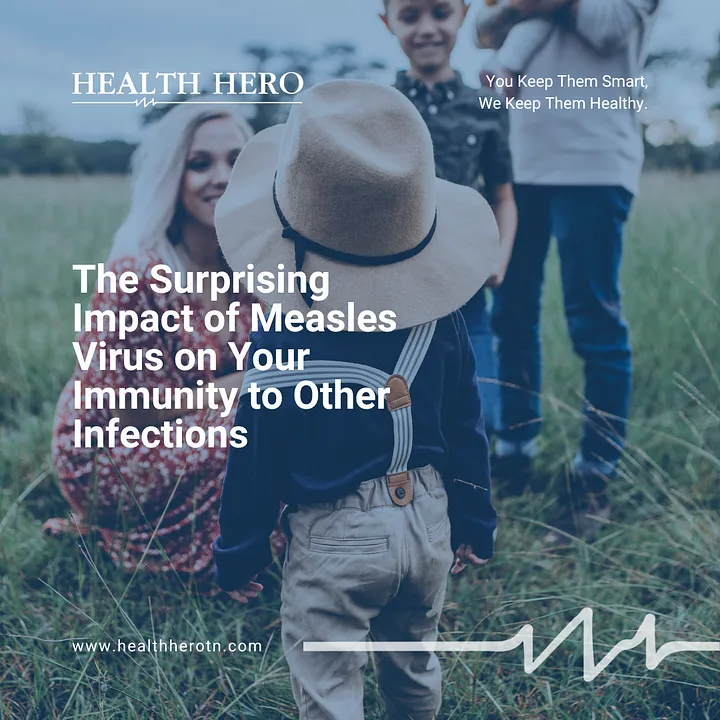Explore the lesser-known consequences of the measles virus, which extends far beyond its immediate symptoms. Research reveals that measles can significantly weaken our immune system’s memory, reducing preexisting antibodies that protect us against other infections. This insight into the measles virus’s impact on our immunity to different pathogens underscores the critical need to comprehend the extensive repercussions of this viral infection. Read on to understand the vital connection between measles and reduced immunity to other diseases, emphasizing the urgency of taking measures to protect your health.
Unveiling the Dark Side of Measles
How Measles Attacks Your Immunity
Measles is not just a childhood disease with a rash and fever; it has a more insidious side. The virus directly targets immune cells, particularly those responsible for memory. Imagine the immune system as a library of past infections. Measles acts like a fire, burning down sections of this library. The result is “immune amnesia,” where the body forgets how to fight off illnesses it once knew how to defeat. This leaves individuals vulnerable to infections they had previously conquered or had been vaccinated against, ranging from the flu to more severe diseases. By undermining the immune system’s memory, measles can erase the protection gained over years, or even decades, in just a matter of days following infection.
The Disastrous Aftermath of a Measles Infection
The consequences of measles extend far beyond the initial illness. After a measles infection, individuals are at a heightened risk for other diseases. This period of increased vulnerability can last for several years. Studies have shown that measles can lead to a spike in hospitalizations for other infections, which can strain healthcare systems. This is particularly troubling for communities with low vaccination rates, where measles can spread rapidly, potentially leading to outbreaks of other diseases. The impact is not limited to the individual; it ripples through families, schools, and workplaces. The economic burden is also significant, with increased medical costs and lost productivity. The aftermath of measles, therefore, poses a serious public health challenge that requires attention and resources to ensure the protection and resilience of our communities.
The Unseen Damage
Measles and Your Body’s Defense Mechanisms
Measles has a profound effect on the body’s defense mechanisms. The virus explicitly targets two cell types critical to the immune response: memory B and T cells. These cells are the custodians of immunological memory, the aspect of the immune system that recognizes and mounts a swift attack against previously encountered pathogens. When measles infects these cells, it reduces their population, weakening the body’s ability to remember and respond to past threats. Furthermore, the virus can also impair the production of new antibodies. This means that the immune system’s memory is disrupted, and its ability to learn from new infections is compromised. As a result, the body becomes more susceptible to various illnesses, turning an individual who was once immune into a blank slate regarding infectious disease defense.
Understanding the Role of Preexisting Antibodies
Preexisting antibodies are the immune system’s first line of defense against pathogens. They are produced by B cells as a response to infections or vaccinations and provide a form of “memory” that helps the body to recognize and neutralize invaders it has encountered before quickly. When the measles virus invades, it can deplete these crucial antibodies, erasing this memory. The loss of preexisting antibodies leaves individuals susceptible to diseases they might have been protected against, such as influenza, pneumonia, and even some gastrointestinal infections. It’s not just about losing a battle against measles; it’s about losing the war against numerous other pathogens that the body once knew how to fight. This knowledge underscores the importance of preventing measles infections, maintaining the integrity of our immune defenses, and safeguarding our long-term health.
Taking Precautionary Measures
The Need for Prompt Action
Prompt action is essential given the severe implications of measles on the immune system. The window for effective intervention is small, as the virus can spread quickly and covertly. Vaccination is the most powerful tool in our arsenal, offering a safe and effective means of preventing measles and its cascade of adverse effects. It’s imperative that individuals, especially in areas with low immunization rates, recognize the urgency to vaccinate. Health authorities should intensify their efforts to inform the public about the risks of measles and the benefits of vaccination. Collaborative community initiatives can play a crucial role in increasing vaccine coverage. The goal is to preempt outbreaks and sustain herd immunity, protecting those who are most vulnerable, including infants and individuals with compromised immune systems. Immediate action is not just a personal health measure; it’s a communal responsibility.
Safeguarding Your Immunity from Measles
Protecting your immunity from measles is crucial, and vaccination is the best way to do this. The measles, mumps, and rubella (MMR) vaccine is effective and has a long-standing safety track record. By getting vaccinated, you protect yourself and contribute to the broader community’s health by preventing the spread of the virus. In addition to vaccination, good hygiene practices, like regular handwashing and using sanitizers, can reduce the risk of transmission. It’s also important to stay informed about measles’s signs and symptoms and seek medical attention promptly if infection is suspected. Health education campaigns can be instrumental in dispelling myths and encouraging proactive health behaviors. By taking these steps, we can fortify our individual and collective health defenses against the measles virus and its extensive impact on our immunity.


